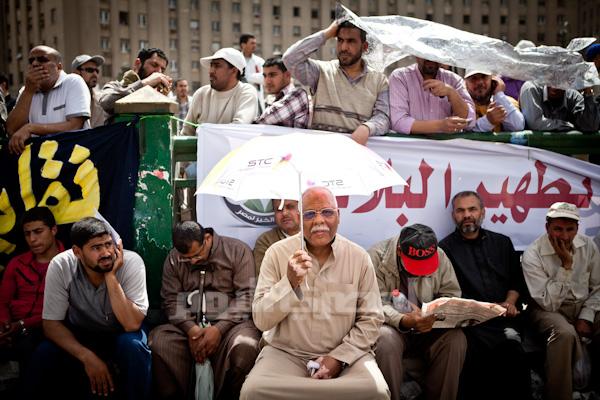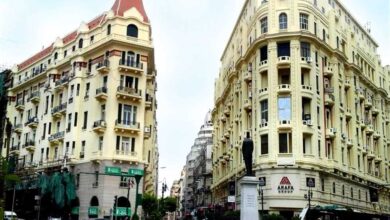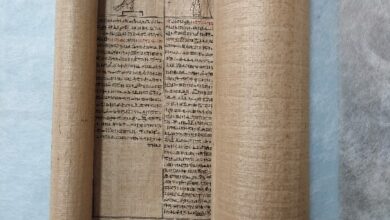
Thousands of Muslim Brotherhood members flocked to the streets on Friday in mass marches in the name of "protecting the revolution." They were the first large-scale political protests the capitol has seen in months, after other revolutionary and liberal forces stopped organizing street demonstrations.
Friday, Islamist protesters walked the same paths that the secularists and revolutionaries have taken previously, chanting the same chants and demanding the same demand; "down with military rule."
The Brotherhood, its Freedom and Justice Party (FJP) and the rest of the Islamists forces had previously abandoned street politics following the country's parliamentary elections, in which the party secured the majority of the Parliament's seats.
Their dominance in the parliamentary elections and disavowal of street protests bred hostility between them and other revolutionaries. Critics said Islamists abandoned the revolution and were only after political gains.
One FJP MP even went as far as to call protesters "thugs" in a recent clash between them and the police forces in which tens of protesters were killed.
Friday's protests came after Omar Suleiman, ex-spy chief under Hosni Mubarak, announced his presidential bid last week. The FJP said in a statement that the protest seeks to join a number of political forces to prevent the return of the ousted corrupt regime.
Other Islamist groups that took part in the demonstration were Jama’a al-Islamiya and its Construction and Development Party, the Salafi Asala Party, the Wasat Party and the Islamic Labor Party.
Though many Islamists have been reserved in directly confronting the ruling Supreme Council of Armed Forces (SCAF), their chants today reflected a souring in the relations between the two powers.
"O Tantawi, we are back to Tahrir, the revolution is still in the square," protesters yelled.
Also heard were: "O Tantawi, Suleiman and Shafiq will never rule us," "live free or die a martyr," and "Say it without fear, SCAF must leave."
Ahmed Shafiq is the former Mubarak-appointed prime minister and minister of civil aviation who this past week announced that he would run in the elections.
Islamist group members said they feel threatened by a return of the Mubarak regime.
"Suleiman's rise to power means another revolution,” said Alaa Mohamed, 50, MB member. "The hands of those people like Suleiman and Shafiq are tarnished with the revolution martyrs' blood."
It's widely believed that Suleiman ad Shafiq are backed by SCAF due to their military backgrounds, and that the council is fielding the candidates in an attempt to keep its own heavy hand in power.
"Our big message today is that you SCAF generals must be delusional if you dare to think you will not hand over power to us, the people, a civilian authority," said Ahmed Mostafa Ibrahim, 26, medical doctor.
The secondary goal, Ibrahim said, was to prevent the nomination of remnants of the regime in the presidential elections."
"There is a clear threat from SCAF and betrayal to the people," he said.
Several youth and revolutionary groups refused to participate in Friday's protest, planning their own one on 20 April. They said Friday's protest was just another phase in the ongoing struggle between the Muslim Brotherhood and the military council that has no relation to the demands of the revolution.
Haytham al-Khateeb, spokesperson for the Revolutionary Youth Union, said the Brotherhood’s decision to take to the square now is “illogical” after it refused to join in protests after security forces used violence on protesters on Mohamed Mahmoud street and in front of the cabinet. Brotherhood officials attacked the revolutionaries during those incidents, he said, but are now seeking their support for Brotherhood demands.
“Principles are integral. The Brotherhood is fighting with the military council over power, not the revolution,” Khaled al-Sayed, a member of the union’s executive bureau, said. “The Brotherhood left Tahrir. They reaped the revolution’s benefits. They gained a parliamentary majority and took control of the legislative committees.”
However, other revolutionaries believe now is not the time for scolding the MB and that they should unite against their common enemy –SCAF and the remnants of the old regime. They said Friday was an opportunity to revive the revolution.
Although he is not a member in the Islamist organization and disagrees with many its positions on the revolution, Mohamed Shokr, 24, joined the march on Friday.
"I believe we have to unite again, because the revolution happened only when we worked together, and a turn against the revolution is a matter of life or death," he said.
The Brotherhood made many mistakes that will not only harm them but also the revolution at large, Shokr said. But on Friday, he said he was glad to see the Brotherhood admit that revolutionary forces were right when they said that SCAF won't genuinely give up power to civilians.
Similarly, on Friday, some among the Muslim Brotherhood seemed to be making an attempt lessen the divide between them and other political forces, shying away from Islamist rhetoric.
Protesters scolded one conservative Salafi who chanted "Islamic state," while another raised a sign that said "All Egyptians against remnants of the old regime; Salafis, Muslim Brothers, Liberals, socialists and communists."
"We are not protesting today under the name of the Muslim Brotherhood. We are here as Egyptians, not Muslim Brothers, because the revolution is at a crossroads," said Ahmed Abdel Aziz, 33, physician.
"Today should be a turning point in the relations with our political comrades," he said.
Abdel Aziz rejected claims that the Brotherhood was not aligned with the revolutionary and liberal political movements' goals.
"While the revolutionary forces were chanting down with military rule, the Brotherhood was practically bringing down military rule through the Parliament," he said. "We were never divided on the goal. In our meetings, we always recognized the SCAF is the revolution's first enemy."
As for why the Muslim Brothers planned their own protest Friday, rather than wait for the previously scheduled 20 April demonstration, Abdel Aziz said the country couldn't afford to wait until then, because it will be only a few days before the announcement of the final list of presidential candidates.
"We can join on 20 April as well, this doesn't mean that we abandoned them," he added.




